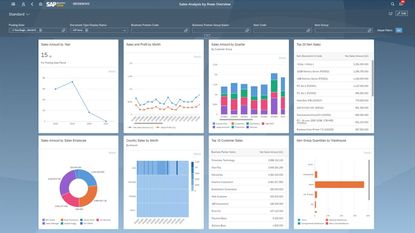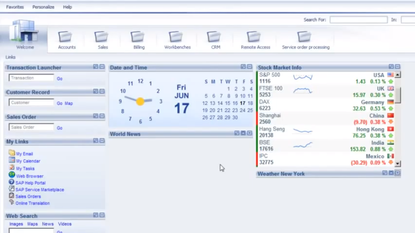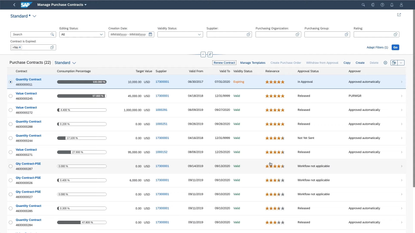SAP vs. JD Edwards ERP
SAP and JD Edwards offer incredibly popular Tier I enterprise resource planning (ERP) software designed to help businesses balance financials, sales, supply chain management, and human resources (HR). Which of these cloud-based ERP software systems best suits your business needs? Find out by reviewing their similarities and differences now.
SAP vs JD Edwards: Software Overview
Use this side-by-side comparison of SAP and JD Edwards software options to review deployment options, pricing levels, and popular features:
What is SAP ERP Software?



SAP, launched in 1972, has over 425,000 customers in over 180 countries using its various ERP systems. They offer multiple ERP products in order to provide options for every business to better plan, execute, predict, and simulate at all times:
- SAP S/4HANA makes both the Internet of Things (IoT) and big data accessible with real-time insight on any data.
- SAP Business One provides comprehensive business management capabilities for small- to medium-sized companies.
- SAP Business All-in-One ERP solution designed for mid-market to enterprise size businesses.
SAP ERP solutions offer a broad range of functional support for a wide variety of industry types, particularly manufacturers and distributors. However, they are also popular with real estate and healthcare companies due to the user-friendly interface.
All SAP systems use machine learning and artificial intelligence (AI) to continually customize functionality. And all of SAP’s cloud platform systems integrate finance, sales, supply chain management, production, project management, and production processes in real-time.
JD Edwards ERP Software
JD Edwards EnterpriseOne, distributed by Oracle, offers a complete suite of modular, pre-integrated industry-specific business applications designed for rapid deployment and ease of administration on a pure internet architecture. It is ideal for organizations that manufacture, construct, distribute, service, or manage products or other physical assets.
The system is primarily used by enterprise-level companies. Their industry focus includes:
- Manufacturing
- Distribution
- Agriculture & Natural Resources
- Construction
- Service
Currently, JD Edwards EnterpriseOne is the only ERP system with the JD Edwards branding. JD Edwards World was their original ERP offering and is now considered a legacy system and end-of-life. While it is still used by companies today, it is no longer sold, and extended support ends April 30, 2025.
Software Deployment Models
There are three main ways to deploy ERP software: on-premise, cloud-based, or hybrid models. Both SAP and JD Edwards offer cloud-based platforms, which means the software is accessible from web browsers and mobile devices and from any location. Pricing for cloud-based ERP is usually based on monthly or annual rates.
All SAP and JD Edwards ERP products are also available with on-premise implementation. This is usually cheaper than the software-as-a-service (SaaS) necessary for cloud deployment since there is, instead, a one-time licensing and implementation fee. These systems are still popular because they don’t rely on a constant internet connection to operate, allowing for more work in areas with questionable connections. It is also easier to secure these solutions when access is limited.
Depending on your exact needs, you can build a hybrid model between the on-premise and cloud-based products. Business software customization allows you to control the level of accessibility.
Winner: Tie, both offer on-premise and cloud deployment.
Pricing
Pricing on ERP products depends on various factors, such as functionality, support expectations, company scale, and user count. As mentioned before, pricing primarily depends on whether you want on-premise or cloud deployment. The costs for implementing SAP or JD Edwards solutions can vary significantly even amongst similar companies.
SAP Business One and Business-All-in-One costs are primarily based on the number of users or logins. Also, SAP products are SaaS subscriptions, paid monthly or annually. Whatever deployment or payment model you select, mid-market to enterprise corporations can expect to spend somewhere in the tens of thousands over the first 3 years of use. The caveat to this is SAP Business One is priced specifically for small businesses, starting at $410/user/year. This allows SAP to provide solutions to companies of all sizes, with S/4HANA being suited for enterprise companies.
JD Edwards EnterpriseOne has a much different pricing structure, as the total cost depends on all the components necessary for your platform. As such, the price tends to be hundreds of thousands of dollars for all combined elements, regardless of whether you seek a perpetual license or SaaS plan. The bare minimum starting price is around $5,605/user/month.
Winner: SAP, as they offer more products to cater to small and midsize businesses.
Software Scalability
The various ERP products developed by JD Edwards and SAP are used by independent freelancers all the way up to global enterprises. It’s important to have an ERP solution which fits your current needs and can anticipate future expansion.
SAP’s ERP solutions are popular with mid-market to small businesses, while larger companies prefer the Business All-in-One. However, scaling your software to fit your growing business needs is easy.
JD Edwards EnterpriseOne is used overwhelmingly by enterprise-level corporations, though it is also used by mid-market and small businesses that are expecting growth.
Winner: SAP
Types of Industries Served
ERP products include features to automate front-office and back-office business processes. These tools can be used by just about every industry imaginable. SAP ERP software is generally used in manufacturing, distribution, and other businesses along the supply chain. These solutions are used less frequently in consulting, real estate, and healthcare.
In contrast, JD Edwards EnterpriseOne is used by the following industries:
- Agriculture and Natural Resources
- Construction
- Distribution
- manufacturing
- Professional Services
- Retail
Additionally, JD Edwards has industry-specific modules available to serve different types of businesses.
Winner: JD Edwards
SAP vs JD Edwards: What is the Best ERP Software?
SAP and JD Edwards each have their benefits, depending on what you’re looking for in an ERP solution.
Your selection will depend on your business needs, company size, and even industry. SAP products tend to be used by small to enterprise-level manufacturers, while JD Edwards is better suited to enterprise and midmarket companies in any field. Yet no single platform has a clear advantage over the others without taking your current business processes into account.
The business software market offers a lot of unique products. Compare some of the most popular ERP options before you buy.
Looking for a new ERP system by SAP or JD Edwards? Get free help from one of our software advisors.




